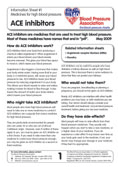ACE (angiotensin-converting enzyme) inhibitors are a type of medicine often used to treat high blood pressure.
They work mainly by allowing the blood vessels to relax and widen so the blood has more space to flow through. Most have names that end in ‘pril’, for example, enalapril, lisinopril, perindopril and ramipril.
How do ACE inhibitors work?
ACE inhibitors stop your body from producing a hormone called angiotensin II, lowering the amount in your blood.
Angiotensin II raises your blood pressure in two ways. It makes the muscles in your blood vessel walls contract, making the blood vessels narrower so your blood has less space to flow through. Angiotensin II also acts on the kidneys, causing them to keep water in your blood stream rather than releasing it in your urine. With more fluid in the blood, there is more pressure on the blood vessel walls.
ACE inhibitors allow your blood vessels to relax and widen, and for fluid to be removed from your blood and released in your urine, lowering you blood pressure.
Who can take ACE inhibitors?
If you have high blood pressure, your doctor or nurse might suggest you take medicines to lower it. It can take some trial and error to find the right one or the right combination, and ACE inhibitors are often one of the first ones you will try, either on their own or alongside another one.
They’re often suitable if you’re under 55 and not of African or Caribbean descent, but can still be an option if that doesn’t apply to you.
They can also be used for people with diabetes, heart failure, some types of kidney disease and after a heart attack. They are particularly useful if you have diabetes and high blood pressure at the same time, or diabetes which has caused some kidney damage that causes them to leak protein into the urine, known as microalbuminuria. ACE inhibitors reduce the pressure in kidneys, so they leak less.
When are ACE inhibitors not suitable?
ACE inhibitors are not suitable if you’re pregnant, breastfeeding or planning to get pregnant.
They can occasionally interfere with certain health problems and medications. Your doctor will consider your overall health and any treatments you’re having before giving you any new medicines.
If you are taking diuretics, you will be carefully monitored if you start taking ACE inhibitors. This is because diuretics remove some of the fluid from your blood which can reduce the pressure and flow of blood through the kidneys. ACE inhibitors reduce the pressure and flow further, which can be harmful for the kidneys. Your doctor will monitor you with regular blood tests, for example during the few weeks when you start taking ACE inhibitors then once a year.
Do ACE inhibitors have side-effects?
All medicines can have side effects, including blood pressure medicines. It’s likely you won’t have any side effects at all with ACE inhibitors, or you might have some that are minor and don’t cause you too many problems.
If you have side effects which don’t improve and are affecting your day-to-day life, you should be able to try a lower dose or a different medicine.
The most common side effect is a persistent dry cough. If you have this side effect, your doctor may prescribe a different type of medicine called an angiotensin receptor blocker (ARB) instead of ACE inhibitors. They work in a similar way but don’t tend to cause a cough.
Other possible side effects of ACE inhibitors include:
- dizziness or feeling light headed
- a sudden drop in blood pressure when you go from lying or sitting down to standing up (postural hypotension)
- headaches
- a rash
- tiredness or weakness
- they can cause kidney problems if you are taking diuretics as well
- swelling around the mouth, face or throat (angio-oedema). This is an allergic reaction and it’s very rare. If it’s hard to breathe or swallow, stop taking the medication and contact your doctor
The leaflet that comes with your medicine will have a full list of possible side effects.
Taking ACE inhibitors
You take ACE inhibitors as a tablet, usually once a day. They can also be part of a combined tablet – where more than one medicine is combined in one tablet – for example with calcium-channel blockers or diuretics.
When you first start
The tablets can start working very quickly. You will probably start with a low dose and will have blood tests and blood pressure checks to see how your blood pressure is responding.
If you are already taking a diuretic medicine, you might need to stop taking it for a few days because the first dose of an ACE inhibitor can sometimes cause a sudden drop in your blood pressure.
ACE inhibitors seem to work better if you also eat less salt
In the long term
Check with your doctor or pharmacist before taking any other medicines at the same time as ACE inhibitors, as they can interact, including medicines you buy over the counter such as painkillers and anti-inflammatories.
If you start taking high blood pressure medicines, it’s likely you will need to keep taking them for the long term. If your blood pressure stays under control for several years, you might be able to take a lower dose or stop taking them altogether. You will have regular blood tests, for example, once a year.
It’s important that you don’t simply stop taking them because your blood pressure will quickly rise again. Always let your doctor, nurse or pharmacist know if you’re struggling because there could be other options you can try.
Read more
ACE inhibitors information sheet
 Download our ACE inhibitors information sheet [PDF 11,134KB].
Download our ACE inhibitors information sheet [PDF 11,134KB].

